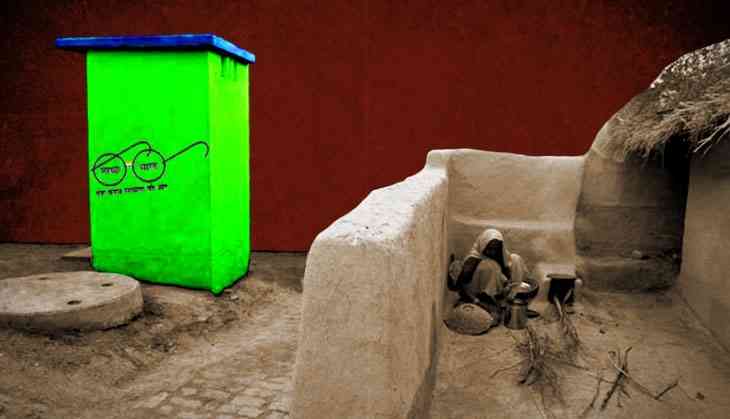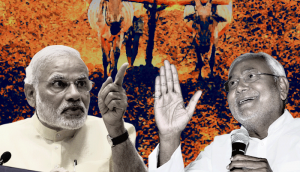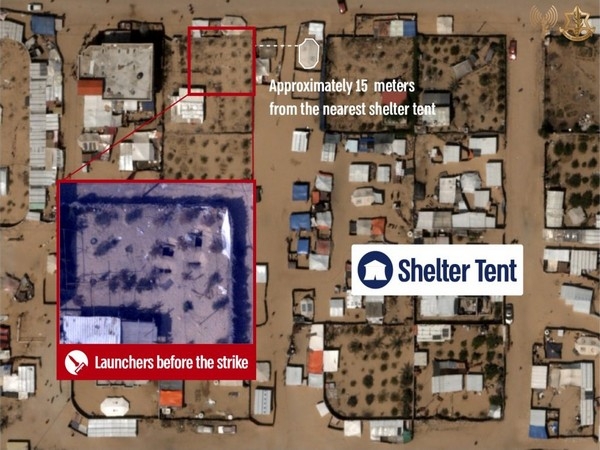
He sat there slightly hunched, not due to age, but in reverence; eyes downcast, never raising it even once to meet ours during the hour-long conversation with him and others residing in the crammed Chamar Basti.
Chamars are one of the lowest among various Scheduled Castes.
The man in question was arrested and kept in confinement overnight by the police, at the behest of local Panchayat functionaries, because he had refused to build a toilet for himself. His refusal was coming in the way of the village being declared open defecation free (ODF).
The canvas on which this is set is the Swachh Bharat Abhiyan and the top-down push to declare an increasing number of districts as ODF. At the last count, 142 (of India’s 707) districts were declared ODF (17 June, 2017).
It could change by the time this note is completed – that’s how frenetic is the pace at which our country is abandoning its old habits and embracing /owning up new ethos, if these statistics are to be believed.
The heat is on district collectors and panchayat functionaries to drop everything else and get toilets constructed on a war footing.
Going by this morning’s news articles about officials beating to death a man who objected to their photographing the women in his family defecating in the open, the Panchayat we visited was not an exception in using intimidating tactics to compel people to construct and use toilets.
Stories of arrests are increasingly becoming common in the ODF tales, celebrating triumph of the clean over the dirty.
It wouldn’t be an exaggeration to say that there was always a glee in the eyes of functionaries at Panchayat and district levels whenever they spoke about the use of arrests, denial of ration, refusal of social welfare benefits and so on to overcome the last mile hurdles to the Swachh Bharat Mission.
The Panchayat we stayed at had wall paintings, warning people that anyone found defecating in the open would be charged under the Indian Penal Code (IPC) sections 269, 270 and 336 and / or fined Rs 201.
A reading of these sections of the IPC (all dealing with endangering the human life) will leave you wondering whether to be angry or amused. And what was the source of this authority that was being openly wielded by Panchayat functionaries? The ever-mysterious ‘Swachh Bharat Kanoon (Law), which no one seems to locate, but everyone seems convinced, exists. And why not, as it allows them to use whatever stick they choose, including the IPC, to make people – the lowly, dirty ones – to comply.
The pressures and the fact that we found the village largely ODF not withstanding, the image of the man refuses to leave my mind for a variety of reasons.
While his arrest and subsequent succumbing to construct a toilet was worn as a badge of achievement by Panchayat functionaries, what did it mean to him?
We searched for anger, bitterness or resentment, but what we encountered was more an air of melancholy and long silences and monosyllabic responses in a subdued tone carrying with it a deep sense of hurt, indignity and possibly fear.
Was it a crime that he, a marginal farmer and agriculture labourer who struggles to make ends meet for him and his family, living in a dilapidated hut with no water supply, suffocating at the bottom of the caste pyramid, placed construction of toilet low down in his priority?
Did it warrant arrest and confinement?
Or in the case of the Rajasthan man, did it warrant death?
Were all other options exhausted before taking such extreme steps?
Did the torchbearers of the Mission, which aims to make the country ODF by 2019, the sesquicentenary birth year of Mahatma Gandhi, think of his talisman before placing those handcuffs on him?
‘Will it restore him to a control over his own life and destiny’, as Gandhi’s talisman urged us to? Quite the contrary, one would think.
As we left the village, it was becoming clearer that threats of fine/arrests and denial of social welfare entitlements were playing a significant role in making villages ODF. And the move seems to be rapidly becoming the panacea to overcome last-mile issues.
So, what if they achieved it under threat and coercive tactics? “How else will ‘these people’ change?” was the first counter question I received as I opened the dialogue with friends – even those from social work background.
This seemed to suggest that it is alright for public good to blunt human rights, posing a challenge to the universal declaration of human rights.
When we disaggregate ‘these people’, we find that there are some common characteristics that define them:
* They are usually from the lower, if not the lowest socio-eco-political strata
* With no disposable income
* No access to private water sources
* Are illiterate or semi-literate
* Have very little exposure to toilet use
* Are on a daily and prolonged struggle to make ends meet.
“We don’t have land to build our own house, and they want us to build a toilet?” a woman in a village in Bihar asked, her voice echoing the irony in her own question.
Not allowing people to defecate in their fields is a common form of intimidation used by landlords against ‘errant’ labourers who defy or question their diktat in any way.
Threat and sanctions can be imposed on the poor because their voices of protest are never heard nor are their suggestions.
And in one stroke, the tacit approval of the state divests ‘these people’ of both their human rights and their right to the welfare state – when ironically, they need it the most.
The threat of such punitive measures is that once it is allowed, there is no limit. Today, there can be a Zafar Hussain, who is allegedly killed for protecting the women in his family from becoming an enemy of the state by the mere act of performing the morning’s ablution. Tomorrow, there may be many who are ‘punished’ in similar ways.
There is no denying that one must leave no stone unturned and work towards a healthier sanitation practice, for its benefits are multi-fold. We would certainly like to see the cess that we, including the poorest of the poor, are paying, help make our country cleaner and healthier.
However, a look at similar attempts in the past tell us that poor quality materials and construction, corruption, distrust in the state, lack of adequate water, etc. has been its nemesis.
Not much has changed, as the vehicle for the SBM delivery continues to be the same bureaucratic apparatus that caused past attempts to fail.
This time around, there are advertisements in every medium possible shaming those who defecate in the open, a boisterous Amitabh Bachchan, aided by a young friend, ridiculing the practice, and urging use of toilets.
This time around, there are corporates building up support for the cause, with a senior CSR official of a leading cement company sharing with us with pride his strategy to promote ODF - “I ask the fathers, how are you sure your daughters are going to answer nature’s call?”
There is also tremendous political backing from none other than the Prime Minister himself and that’s a big plus.
However, history has also shown us that education, exposure, disposable income and availability of water are key elements that played a significant role in transitioning communities from open defecation to toilet use.
Will the political push and threat/ coercion replace the more fundamental enablers and be the shortcut, the panacea, to an open defecation-free country?
Or will the irony of “phus phas ka ghar, eenta ka shauchalay (a house of hay and toilet of bricks)” bring home the reality of the Swachh Bharat Abhiyaan? Will it help evolve a more inclusive, sensitive understanding of the shortcomings, that goes beyond the ‘mindset’ of “people like to do it in the open” so they “have to be coerced into using toilets”?
Either time will tell, or more Zafar Hussains will wake us up to ogres staring us in the face.
Edited by Joyjeet Das







![BJP's Kapil Mishra recreates Shankar Mahadevan’s ‘Breathless’ song to highlight Delhi pollution [WATCH] BJP's Kapil Mishra recreates Shankar Mahadevan’s ‘Breathless’ song to highlight Delhi pollution [WATCH]](http://images.catchnews.com/upload/2022/11/03/kapil-mishra_240884_300x172.png)

![Anupam Kher shares pictures of his toned body on 67th birthday [MUST SEE] Anupam Kher shares pictures of his toned body on 67th birthday [MUST SEE]](http://images.catchnews.com/upload/2022/03/07/Anupam_kher_231145_300x172.jpg)




_251372_1280x720.jpg)
_251371_1280x720.jpg)
